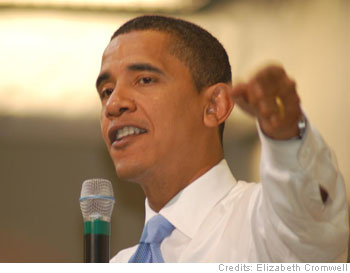 There’s been an enormous amount of media commentary in recent days on President Obama’s slipping popularity and what he woulda coulda shoulda done differently. One day after Obama scored his latest big accomplishment — passage of the huge financial reform bill– the NYT puzzles over why Obama’s star is falling and says he hasn’t been able to “change the partisan tone in the capital.” In Politico, editors John Harris and Jim Vandehei say Obama “has shown himself to be a Big Government liberal,” which is “killing him with independent-minded voters.”
There’s been an enormous amount of media commentary in recent days on President Obama’s slipping popularity and what he woulda coulda shoulda done differently. One day after Obama scored his latest big accomplishment — passage of the huge financial reform bill– the NYT puzzles over why Obama’s star is falling and says he hasn’t been able to “change the partisan tone in the capital.” In Politico, editors John Harris and Jim Vandehei say Obama “has shown himself to be a Big Government liberal,” which is “killing him with independent-minded voters.”
I’m skeptical about journalistic second-guessing about political tactics and messaging. When unemployment remains stuck above 9 percent, with a huge share of those people jobless more than six months, nobody is going to be popular.
That said, two new pieces today — one in Salon and one in the Fiscal Times — offer specific examples of tone-deafness at the White House.
At Salon, Andrew Leonard describes Obama’s remarkably bloodless trip yesterday to Michigan for the groundbreaking of a factory that will make batteries for the Chevy Volt and other electric cars. In itself, Leonard says, the visit was a fine way to highlight how economic stimulus money is financing jobs and new energy technology. But he says Obama strikingly failed to make the broader case:
I didn’t hear him talk about how Republicans have blocked the extension of unemployment benefits, or refuse to allow new taxes on hedge fund managers. He didn’t whisper a word about how ridiculous Republican anti-regulation rhetoric sounds in the wake of the biggest financial crisis since the 1930s. Perhaps most disappointing, he didn’t lay out any plan for future action. “We’re not out of the woods yet” he said. But he didn’t breathe a word about how we’re going to get there,
If you suspect that the White House is lackluster in pushing for more aggressive job creation, my colleagues at the Fiscal Times offer this revealing look at the strange fight over $10 billion to prevent teacher layoffs nationwide. Rep. David Obey, chairman of House Appropriations, found a way to attach the money — repeatedly blocked by Republicans in the Senate — to the supplemental funding bill for Afghanistan. But the White House threatened a veto because Obey paid for some of it by cutting 15 percent from “Race to the Top,” Obama’s signature grant program for education reform projects.
Obey told the Fiscal Times’ Eric Pianan and Adam Graham-Silverman that he asked the White House for alternative places to find the money, and that the White House suggested cuts in food stamps. Food stamps? In the middle of protracted unemployment?
- Bulenox: Get 45% to 91% OFF ... Use Discount Code: UNO
- Risk Our Money Not Yours | Get 50% to 90% OFF ... Use Discount Code: MMBVBKSM
Disclaimer: This page contains affiliate links. If you choose to make a purchase after clicking a link, we may receive a commission at no additional cost to you. Thank you for your support!



Sign this! "Petition to Reduce the Wages of Congress Men and Women from $174,000 per year to $50,000 per year."
Copy & Paste below link into address bar: http://uspoverty.change.org/petitions/view/petiti…
Pass it on!
Ed:
The New Bank of Obamica Allows Withdrawals only on February 30th. "Trust Your Dough to the Big B.O." – deets at:
http://spnheadlines.blogspot.com/2010/07/financia…
Peace! :-)